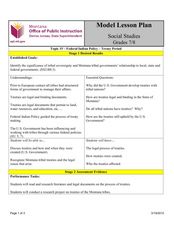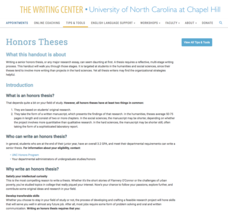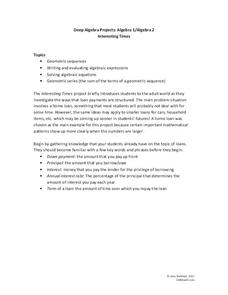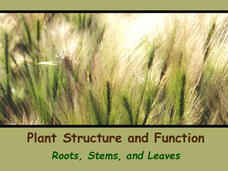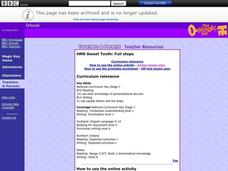Curated OER
Alexander And The Wind-Up Mouse
Use drama techniques to recreate the story, Alexander and the Wind-Up Mouse by Leo Lionni. They engage in problem-solving as they identify the roles they will fufill in their groups for the performance. This is a motivating way to...
5280 Math
More or Less the Same
Tell the story of the math. Given a graph of a linear system, learners write a story that models the graph before crafting the corresponding functions. Graphs intersect at an estimated point, allowing for different variations in the...
Education Fund
Fear the Scarce Resources
In a life or death situation, what resources would you choose to survive—and why? A zombie attack simulation teaches learners the concepts of scarcity and resources in regards to economics. The hands-on activity requires individuals to...
Population Connection
A Demographically Divided World
Did you know that birth and life rates vary across the world? The resource, the second in a six-part series, discusses just how demographics differ across countries and why it might be the case. Scholars complete worksheets, watch...
Curated OER
The Princess's Point of View
Everyone wants to be part of a royal family. Let your pupils experience the privilege of royalty by rewriting the story The Frog Prince from the point of view of the princess. While the story line remains the same, perspective is bound...
Southern Nevada Regional Professional Development Program
Common Core Writing Strand: The Research Paper Template for Standards 7-8
Considering a research paper for freshman and sophomores? Here's a template designed to meet the W.9-10.7 and 8 Common Core writing standards. Writers outline their research question, claims, counterarguments, support, commentary, and...
Developing a Global Perspective for Educators
Imagine Being Me
The design of this two-day activity eloquently exposes learners to the topic of social justice for people with disabilities. The plan is built off the reading of Are You Alone on Purpose? by Nancy Werlin. The activity introduces readers...
Curated OER
Digestion & Nutrition: a Case Study
Students explore digestion/nutrition and utilize scientific investigation skills. They complete meal logs for several days and graph their results. After analyzing their data, they write formal lab reports.
Bowland
How Risky is Life?
"Life is more risk management, rather than exclusion of risks." -Walter Wriston. Scholars use provided mortality data to determine how likely it is a person will die from a particular cause. They compare the data to the perception of the...
Curated OER
Federal Indian Policy
Students recognize the provisions of federal Indian policy. In this Federal Indian Policy lesson, students research legal documents (treaties). Students research the Montana tribes. Students answer critical thinking questions based on...
Curated OER
Freshwater Fish Anatomy & Taxonomy
Tenth graders use a classification key to identify organisms. In this classification lesson students identify freshwater species of fish and document their observations.
It's About Time
Conservation of Momentum
Assist your class with understanding collisions as they apply the Law of Conservation of Momentum. Pupils measure the momentum before and after manipulation of two objects so that one strikes another in an inelastic collision. The lesson...
Curated OER
Bacterial Transformation - Biology Teaching Thesis
Students explain the following processes: bacteria transformation, genetic recombination, and antibacterial breakdown of bacteria. They follow lab protocol and use the scientific method: to make predications, and to explain an unexpected...
Curated OER
Presenting Ethical Dilemmas in the Classroom
Students explore the dilemma of bioethics. Students review a cast study on a bioethical topic. They research the facts, values, and stakemakers in the controversial debate. Students consider the consequences and discuss their findings...
Curated OER
T3 Lesson Plan: Number 3
Sixth graders investigate local water. For this water cycle lesson, 6th graders take samples from surrounding water sources. Students record data from the samples, compare and graph the results.
University of North Carolina
Honors Theses
For those enrolled in a college honors program, four years of hard work culminate in one paper—an honors thesis. A handout outlines the steps to writing the paper, beginning with a sample timetable and time management instructions. Once...
5280 Math
Interesting Times
Gain a little interest in functions with a real-life task. Young scholars analyze home loan data with a geometric sequence and series. They use the models to make predictions about the total loan payments at certain intervals in a useful...
Biology Junction
Plant Structure and Function: Roots, Stems, and Leaves
Scientists found fossils of plants more than 420 million years old—but plants existed for up to 100 million years prior to these fossils. Learn about the importance of plants to the entire planet. Viewing a presentation helps scholars...
Curated OER
Do Plants Need Water?
First graders utilize observational skills to articulate similarities and differences in the plants they observe. They make comparisions of size, color, and height. Lima beans are planted at successively farther distances from a water...
BBC
Full Stops
This is an incredibly detailed and thorough plan. It is all about full stops - which is the British way of saying, "Periods." First-year learners practice the skill of knowing when to use a period, and understand what periods are meant...
BBC
Sweet Tooth - Full Stops
Young writers engage in a activity which reinforces the concept of when to use periods, "full stops" as they're called, when writing. There is a terrific online activity built into the plan which gives the kids valuable practice, then a...
Curated OER
Children's Playthings And Books
High schoolers categorize studenT toys by intelligence types. They review toy safety and function and identify the appropriate play age of various toys. They read and evaluate studenT books and write one of their own.
Curated OER
Population Biology Case Study
Students are focused on the big question: What makes a population grow and how could that growth stop? They use these concepts to help answer the big question: carry capacity, density dependent v. density, independent factors, predation...
Curated OER
Drinking Water and Water Purification
Sixth graders design experiments to compare the amount of bacteria in river water to the amount in purified tap water. They explore how water purification removes bacteria and pollution from the water. Students examine the steps of the...
Other popular searches
- Developmental Stages
- Piaget Developmental Stages
- Developmental Stages of Art
- Child Developmental Stages
- Child Development Stages
- 8 Stages of Development
- Reading Development Stages











